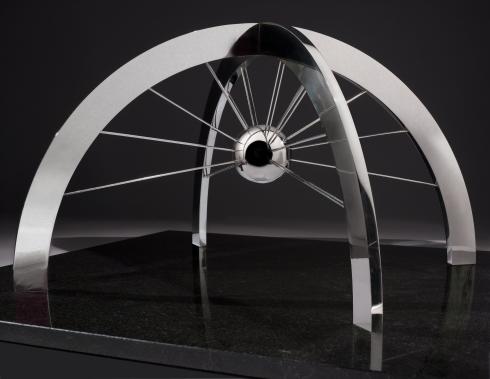
Media Inquiries
Public Inquiries
Museum Names Prestigious Award for Apollo 11 Astronaut Michael Collins
Honoring Astronaut Michael Collins’ legacy in aviation and space, the Smithsonian’s National Air and Space Museum is renaming its trophy for the Apollo 11 command module pilot. The recognition is awarded annually for Lifetime and Current Achievements. The 2020 recipients are Charles Elachi for Lifetime Achievement and the Hubble Space Telescope Team for Current Achievement. The recipients will receive their awards March 26* at a ceremony at the museum’s Steven F. Udvar-Hazy Center in Chantilly, Virginia.
Established in 1985, the award recognizes outstanding achievements in the fields of aerospace science and technology and their history. Trophy winners receive a miniature version of “The Web of Space,” a sculpture by artist John Safer. The renaming of the trophy recognizes Collins’ contributions to aerospace and his service to the museum as director during a critical time in its evolution.
“I am deeply honored to have been made a part of the museum’s legacy recognizing the best in the aerospace industry,” said Michael Collins. “The National Air and Space Museum is a testament to thousands who helped craft it into the wonder it is today. I hope the award inspires future generations to keep reaching outward bound.”
2020 Michael Collins Trophy Recipients
Elachi will receive the 2020 Michael Collins Trophy for Lifetime Achievement honoring his distinguished career in the fields of remote sensing, planetary science and spaceflight-program management. After pioneering techniques in radar remote sensing for surface, ocean and atmospheric phenomena, he executed these techniques in leadership roles in various missions. He was the director for space and Earth sciences for almost 20 years at NASA’s Jet Propulsion Lab (JPL), and the director of JPL for 15. Under his leadership, JPL achieved many successful planetary, earth and astronomy missions including several Mars lander, rover and orbiter missions, pioneering missions to outer planets, such as the Cassini mission to Saturn, and the Spitzer and Kepler Space Telescopes. The breadth of his expertise allowed synergy between the technical aspects of radar remote sensing and the interpretation of the acquired science data, which is now a standard approach in Earth and planetary science. Through this lifetime of success, he has also served as a significant mentor to many in industry and academia.
As the Hubble Space Telescope celebrates its 30th year in operation, the team behind Hubble will receive the 2020 Collins Trophy for Current Achievement. Hubble has changed humans’ fundamental understanding of the universe, having taken over 1.4 million observations and provided data that astronomers have used to write more than 17,000 peer-reviewed scientific publications on a broad range of topics. Through the efforts of the Hubble team since 2018, the observatory has continued to produce science unachievable with any other instrument, including studies of the first possible moon orbiting a planet outside the solar system, imaging the first known interstellar object to visit the solar system and finding water vapor on an extrasolar planet in the habitable zone. System engineers in Hubble’s control center and science operations facility have continued to find creative ways to operate the 30-year-old spacecraft to make this revolutionary science possible and ensuring its capabilities will continue for years to come.
More information about the Michael Collins Trophy and a complete list of past winners are available at https://airandspace.si.edu/trophy-award.
The National Air and Space Museum Trophy event is made possible through the support of Atlas Air Worldwide, BAE Systems, Blue Origin, Booz Allen Hamilton, The Claude Moore Charitable Foundation, Jacobs, Leidos, National Air Traffic Controllers Association, National Business Aviation Association, Pratt & Whitney, Seabury Capital, Sierra Nevada Corp. and Thales.
The National Air and Space Museum on the National Mall in Washington, D.C., is located at 655 Jefferson Dr. The museum’s Steven F. Udvar-Hazy Center is located in Chantilly, Virginia, near Washington Dulles International Airport. Both facilities are open daily from 10 a.m. until 5:30 p.m. (closed Dec. 25). Admission is free, but there is a $15 fee for parking before 4 p.m. at the Udvar-Hazy Center.
*This event has been postponed as a public health precaution.
# # #